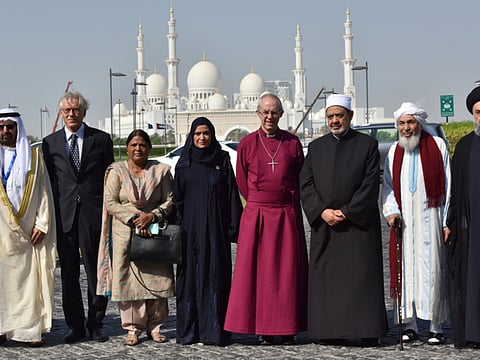Religious leaders call for peaceful, integrated world
No peace among nations without peace among religions, says Grand Imam of Al Azhar

Abu Dhabi: Religious leaders from the Muslim Council of Elders — an independent international body that aims to promote peace in Muslim societies — and the Anglican Church yesterday (Wednesday) called for setting up a peaceful and integrated world.
Dr Ahmad Al Tayyeb, Grand Imam of Al Azhar, Egypt’s highest religious authority, called on Wednesday for peace and understanding between Islam and Christianity, saying “as the very survival of the world itself is perhaps at stake we Muslims and Christians should let the unpleasantness between us become a thing of the past”.
Stressing that if Muslims and Christians are not at peace, the world will not be at peace, the Grand Imam quoted the Swiss Catholic theologian Hans Kung as saying: “No peace among the nations without peace among the religions.”
“I hope we are able to let bygones be bygones, forget hatred and bitter feelings of the past and look forward to a brighter future while assured that one day we will appear before Almighty Allah and answer our deeds towards Him and towards His creatures,” Dr Al Tayyeb said as he gave his keynote speech at a dialogue on integration, religious freedom and flourishing societies organised in Abu Dhabi by the Muslim Council of Elders and Christian leaders from the Anglican Communion.
Dr Al Tayyeb said Islam highly appreciates efforts to make people happy, have mercy on animals or protect plants and nonliving things. “So let our differences not cause hatred and strife between us. Let us vie with each other only in righteousness and good works,” the Grand Imam of Al Azhar said.
Dr Al Tayyeb called for taking the opportunity of holding the first such meeting between Muslim elders and religious leaders from the Anglican church to take a new step on the road to building an integrated world of concerted action to mitigate the suffering of the people from horror, pain and blood and wars.
The Archbishop of Canterbury, Justin Welby, spiritual head of the Anglican Church, said it was fitting that the meeting is taking place in a country which has taken practical steps to enable religious minorities to meet, teach, worship and express themselves. It shows a confidence in granting freedom, and a self-confidence which is fitting and proper. “We can only be grateful for the clear thinking expressed here. This freedom cannot be taken for granted in a world currently beset by a crisis of confidence in the rights it pledged itself to uphold in the aftermath of the Second World War.
“Democracy without fundamental values around the value of the human being, and, I would say, without the understanding of God’s grace and love for the humanity God created, is a recipe for majority tyranny,” he said.
Stressing that God created us to respond freely, not by compulsion or coercion, but to be in relationships of love with Him by choice, the Archibishop said religious freedom is more than just freedom from persecution; it is the freedom to choose how to express our understanding of our relationship with God.
“Faith groups should be at the forefront of advocacy for human rights because we recognise that, ultimately, we are answerable and accountable to God alone who created individuals with dignity and integrity. This freedom is integral to the flourishing of our societies, but it does not emerge in a vacuum and neither does it come without responsibility.”
The Archbishop of Canterbury said the challenge then is “for all of us at this conference to make some serious progress in establishing not just the theological foundations for flourishing and integrated societies where freedom of religion and belief is a given, but to go much further and to establish practical steps to ensure this happens in the societies and countries we represent and live in.”
Shaikh Abdullah Bin Bayyah, President of the Forum for Promoting Peace in Muslim Societies, said conversation with other religions in Islam is religious duty and a human necessity. He quoted the Quran saying: “And do not argue with the followers of the Book except by what is best, save with those of them who act unjustly, and say we believe in that which has been revealed to us and revealed to you, and our God and your God is One, and to Him do we submit.”
Dr Mouneer Anis, Archbishop of the diocese of Egypt, said, “We who believe in the one and only God need to realise that God only, not us, is capable of guarding the truth in which we believe. The act of depriving people of religious freedom as a response to pluralism causes breakdown in communities, due to hurt and lack of respect on both sides. When force is used to guard religion and ‘truth wars’ arise, such as the bitter wars in Europe between Catholics and Protestants in the sixteenth and seventeenth centuries, everyone suffers. In our world today, equivalent resort to extreme force to convince or convert others happens in the name of religion, as we all know.”
Sign up for the Daily Briefing
Get the latest news and updates straight to your inbox



